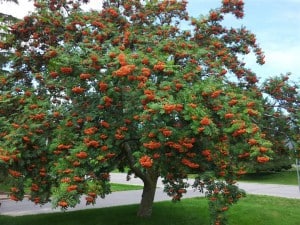The drought conditions we had last summer may be the reason why nearly all of the trees and shrubs are laden with a heavy crop of seeds and fruit.
This explanation is courtesy of Michael Snyder, a forester, and Commissioner of the Vermont Department of Forests, Parks and Recreation. This was written in August, 2011.
“Curiously, stressed trees do sometimes produce a reactive burst of flowering which – if all goes to plan – leads to enhanced fruit and seed production. Now why would a stressed tree add stress by running down its reserves that could otherwise be used for growth or to recover from the original stress?
One possibility is that, high costs and multiple risks notwithstanding, trees need to produce seed to pass along their genes and perpetuate their kind. This is the biological imperative. It is so important that heavy seed production may be triggered in some trees as a reaction to significant, threatening stress. It’s as if the trees interpret stresses like summer drought or insect defoliation as a sign of the beginning of the end, and they react to impending doom by shifting their precious and hard-won resources away from their own growth and focus on the next generation. In other words, under this hypothesis, stressed trees put what energy they have left into flowering to make baby trees before they can’t.
Perhaps the heavy flowering and fruit production that has been so widespread in Vermont this year was triggered by the double-whammy of stresses that occurred the previous spring and summer when damaging late frosts were followed by a significant July drought (2010). These combined stresses may have been sufficient to trigger an increase in the number of preformed flower buds initiated last summer, which then burst forth so noticeably this spring and summer as flowers, fruits, and now seeds.”
